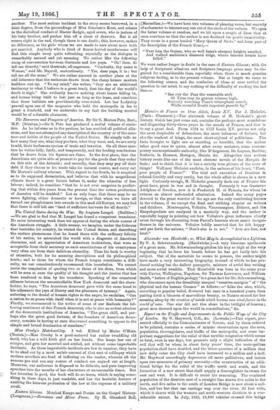Histoire de France au 18me Siècle, Louis XV: Par J.
Blichelet. (Paris : Chamerot.)—The sixteenth volume of M. Michelet's great history, which has just come out, contains the perhaps most scandalous and disgusting thirty-three years in the annals of France, and that is to say a great deal. From 1724 to 1757 Louis XV. proves not only the most despicable of debauchees, the most infamous of fathers, but also the weakest of kings, the most short-sighted of politicians. The facts brought to light are so startling, so horrible, that the author takes good care to quote, almost after every sentence, some contem- porary unexceptionable authority, like D'Argenson; Do Lutists, Barbier, Soulavie, is Hausset, Montgon, Marais, &c. Altogether that serious history roads like one of the most obscene novels of the Marquis de Sade ; and to think that it is but a strictly true picture of the state of things ! Well may Michelot exclaim, in the sadness of his heart, "Poor, poor people of France !" The trial and execution of Damions is related forcibly and very curtly, but the whole affair is shown in a new light. Curiously enough, M. Mieholet generally finds out of France his great hero, great in war and in thought. Formerly it was Gustavus Adolphus of Sweden, now it is Frederick IL of Prussia, for whom he evinces an almost unbounded admiration. Indeed the many pages devoted to the great warrior of the ago are the only comforting feattne in the volume, if we except the final and striking chapter on write's and thinkers. Montesquieu, Voltaire, Vauvenargues, Diderot, and the Encyclopaadists are analyzed in a masterly way, and the author is especially happy in pointing out how Voltaire's great influence chiefly arose through his dissenting from Pascal's laments about man's insigni. ficence in the universe. Voltaire boldly asserted that he felt happy and put forth the axioms, "Man's aim is to act." "Acts are free, not fatal."






























 Previous page
Previous page